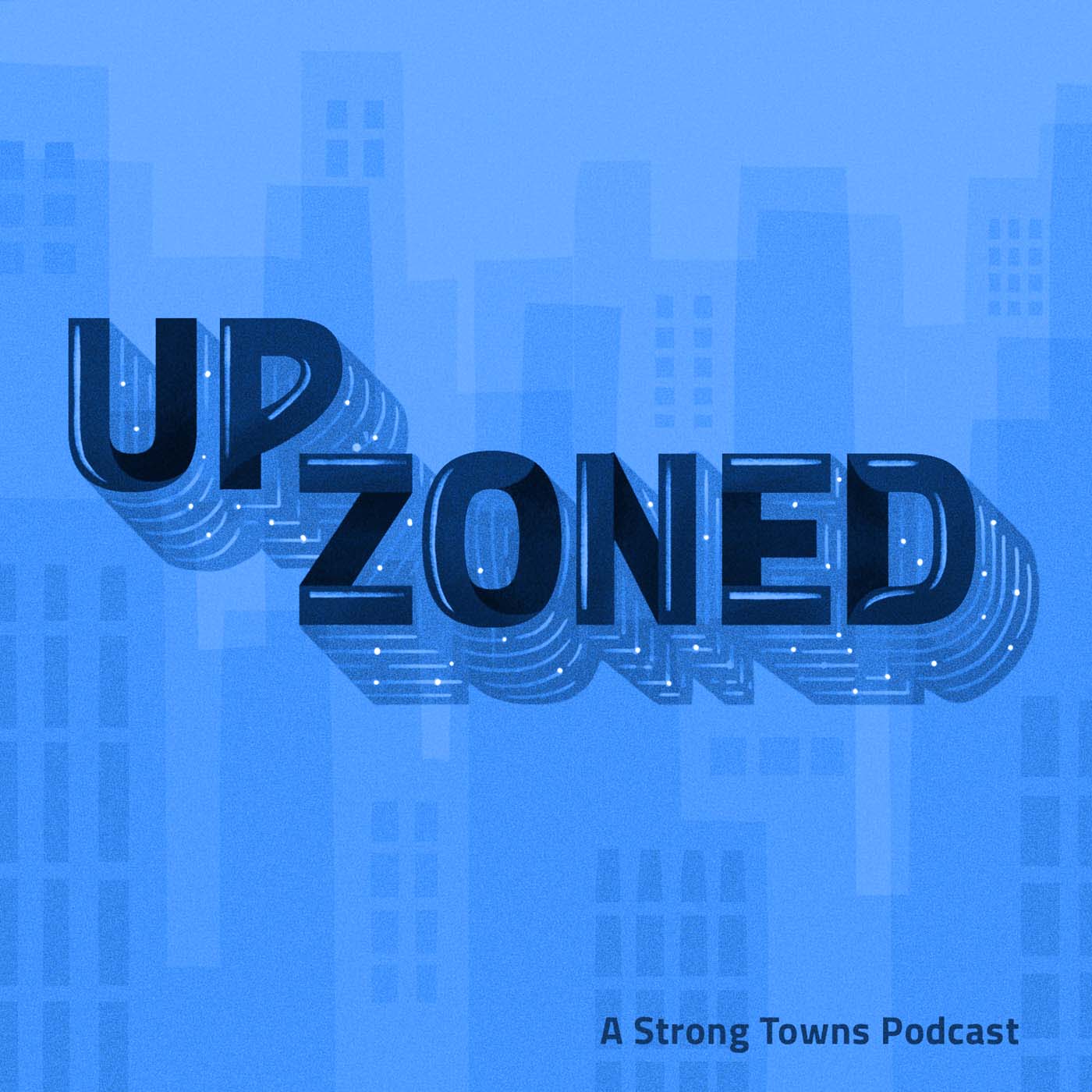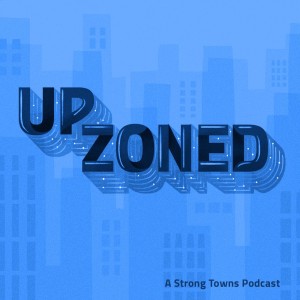
Sometimes, a hot new story will cross our desks that we need to talk about right away. That's where Upzoned comes in. Join Multistudio's Abby Newsham, Strong Towns President Chuck Marohn, and other guests to talk in depth about one big story from the week in the Strong Towns conversation, right when you want it: now.
Sometimes, a hot new story will cross our desks that we need to talk about right away. That's where Upzoned comes in. Join Multistudio's Abby Newsham, Strong Towns President Chuck Marohn, and other guests to talk in depth about one big story from the week in the Strong Towns conversation, right when you want it: now.
Episodes

Wednesday Jun 14, 2023
Live From the National Gathering
Wednesday Jun 14, 2023
Wednesday Jun 14, 2023
A few weeks ago, the first Strong Towns National Gathering took place in Charlotte, NC. While people buzzed back and forth between sessions, Upzoned host Abby Kinney sat at a table and invited those walking by to join her on the podcast. This week, you’ll hear Strong Towns members from all over talking about who they are, what they’ve seen in their communities, and what they’re doing.
Also, it’s Member Week at Strong Towns, and podcasts like Upzoned wouldn’t be possible without our members! Join today to support the movement and the advocates who are making our places stronger and more financially resilient.
ADDITIONAL SHOW NOTES
-
Note: When trying to make our communities a better place, we look for the “smallest next thing” that can be done. Strong Towns is no exception: it’s how we function as an organization. We’re always taking the smallest next step and learning as we go, and sometimes, it’s not perfect. The audio recorded for this podcast is an example. We experienced a handful of technical glitches and as a result, the audio is low quality, and sometimes difficult to hear. Because of all the people who put work into this episode, we opted to still publish despite the technical issues throughout. We hope you enjoy listening to people on the ground. Next year, we’ll be better prepared to record audio on site!

Wednesday May 17, 2023
Parking Regulations Threaten to Demolish Coffee Shop
Wednesday May 17, 2023
Wednesday May 17, 2023
In Kansas City, Kansas, parking regulations have threatened to demolish a local coffee shop for a parking lot. An out-of-state developer is trying to meet the city’s strict parking requirements for a new apartment complex across the intersection, and the coffee shop owner, T.J. Roberts, is trying to save what’s become a special community hub.
On this Upzoned episode, host Abby Kinney talks with Roberts about his inspiration for building community, and his struggle to keep his coffee shop, Kinship Cafe, from getting torn down. Also on the show is Dennis Strait, a principal at architect firm Multistudio, to talk about why city builders should care about a coffee shop over convenient parking spaces.
ADDITIONAL SHOW NOTES
-
“‘It’s heartbreaking.’ Why parking rules threaten one of KC area’s few Black coffee shops,” by Kevin Hardy, The Kansas City Star (May 2023).

Wednesday May 03, 2023
An Abandoned Downtown Equals a Pot of Gold?
Wednesday May 03, 2023
Wednesday May 03, 2023
Not everyone who left the office for remote work returned after the pandemic lockdown ended. Many employees stayed remote, and, in doing so, they left behind a swath of empty office buildings in downtowns across North America. Developers see these abandoned places as easy cash, that is, if you can find the right sort of abandoned office space. On this episode of Upzoned, urban developer Andrew Ganahl talks with host Abby Kinney about the challenges of this pattern of growth, but also the good that could come out of it.
ADDITIONAL SHOW NOTES
-
“The developers who see dollar signs in abandoned downtowns,” by Alex Mayyasi, The Hustle (April 2023).

Wednesday Apr 12, 2023
One Reason American Architecture Is Considered Boring: Stairs
Wednesday Apr 12, 2023
Wednesday Apr 12, 2023
Have you ever wondered why multifamily housing has the same, copied look in most places? Part of the reason is due to the way regulations require architects to build stairs. On this Upzoned podcast, host Abby Kinney talks with special guest and architect Kevin Klinkenberg about how building codes and zoning laws can be helpful, yet at the same time limit building possibilities.
ADDITIONAL SHOW NOTES
-
“Why Does American Multifamily Architecture Look so Banal? Here’s One Reason,” by Michael Eliason, The Architect’s Newspaper (March 2023).

Wednesday Apr 05, 2023
Cowboy Hotels for Housing Shortages
Wednesday Apr 05, 2023
Wednesday Apr 05, 2023
Like all major cities in America, Seattle is facing a housing shortage. And 100 years ago, Seattle faced a housing shortage bigger than the one it has now. The initial response to the historic shortage was to build small, boxy, apartment buildings holding four to six apartments (called Cowboy Hotels) that blended in with the houses already established in the neighborhood. In this Upzoned episode, host Abby Kinney and co-host Chuck Marohn talk about Cowboy Hotels and their financial possibilities.
ADDITIONAL SHOW NOTES
-
“Small Apartments From 100 Years ago Offer Townhome Alternative,” by Joshua McNichols, KUOW, (March 2023).

Wednesday Mar 29, 2023
Homelessness in Rural America
Wednesday Mar 29, 2023
Wednesday Mar 29, 2023
Homelessness in rural areas can look different than in bigger cities: as noted in a recent article by The Daily Yonder, rural homelessness is more “hidden,” and is expressed through couch surfing, roommate arrangements, and housing insecurity versus seeing people without homes on the street.
What can we do to address the housing crisis in rural communities? Join host Abby Kinney and co-host Chuck Marohn on the Upzoned podcast as they talk about this growing problem and possible solutions.
ADDITIONAL SHOW NOTES
-
“Tackling Rural America’s ‘Hidden’ Housing Crisis,” by Taylor Sisk and Jan Pytalski, The Daily Yonder (March 2023).

Wednesday Mar 22, 2023
High-Income Earners Are Renting Instead of Buying Homes
Wednesday Mar 22, 2023
Wednesday Mar 22, 2023
High-earning Americans are renting instead of buying homes. Some even say they plan to rent indefinitely. Why is that? In this week’s Upzoned episode, join host Abby Kinney and guest Norm Van Eeden Petersman as they talk about this trend.
ADDITIONAL SHOW NOTES
-
“Three Million U.S. Households Making Over $150,000 Are Still Renters,” by Will Parker, The Wall Street Journal (March 2023).

Wednesday Mar 15, 2023
When a Building Is Demolished, What Should Happen to the Materials?
Wednesday Mar 15, 2023
Wednesday Mar 15, 2023
“What happens when old buildings have reached the end of their life, either their useful life in terms of safety or their desirable life in terms of modern living?” a Next City article asks. The piece goes on to say that when buildings throughout the U.S. get demolished, the once useful construction materials often end up in landfills. But there’s a growing movement to try and disassemble buildings carefully, and rescue building materials to be used in other projects. In today’s Upzoned episode, host Abby Kinney and co-host Chuck Marohn talk about this growing movement.
ADDITIONAL SHOW NOTES
-
“How A Deconstruction Company And Salvage Shop Are Keeping Building Materials Out Of Landfills,” by Cinnamon Janzer, Next City (March, 2023).

Wednesday Mar 08, 2023
The 15 Minute City - A Good Life or an Infringement on Freedoms?
Wednesday Mar 08, 2023
Wednesday Mar 08, 2023
The 15 Minute City: a term to describe mixed use neighborhoods, has become a political concept where critics believe the idea could result in an infringement on personal freedoms.
On this Upzoned podcast, host Abby Kinney and special guest Kevin Klinkenberg, talk about this contentious topic of the 15 Minute City and answer the question: Are the concerns people have (about 15 minute cities) warranted, or is this something that we should all be rolling our eyes at and moving on from?
ADDITIONAL SHOW NOTES
“The 15 Minute City - Where Urban Planning Meets Conspiracy Theories,” by Chris Standford, The New York Times (March, 2023)
“The Messy City Podcast” by Kevin Klinkenberg.
Abby Kinney (Twitter)
Kevin Klinkenberg (Twitter)
Theme Music by Kemet the Phantom

Wednesday Mar 01, 2023
Wednesday Mar 01, 2023
It’s important to build safe and productive streets, but how do we ensure those streets are a place people want to be and live in? Whose responsibility is it to ensure that buildings interact with the public realm in a delightful way? Design is hugely impactful in our daily lives: it can determine if a place is somewhere for people, or if it’s unlivable and unusable. And design isn’t wholly up to the “eye of the beholder.” It’s possible to quantify beauty.
Today on the Upzoned podcast, join host Abby Kinney as she welcomes a special guest: Tristan Cleveland, Strong Towns member, urban planner at Happy City, and PhD candidate with Healthy Populations Institute. In this episode, Abby and Cleveland talk about his recent Planetizen article, “The Responsibility of the Building to the Street.”
ADDITIONAL SHOW NOTES
-
“The Responsibility of the Building to the Street,” by Tristan Cleveland, Planetizen (February 2023).
